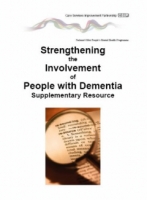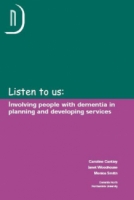Strengthening the involvement of people with dementia toolkit
Published: 2008
Author: Care Services Improvement Partnership

Strengthening the involvement of people with dementia toolkit supplement
Summary: This toolkit augments the section ‘Involving service users and their carers’ in ‘Everybody’s Business – a service development guide’ (DH 2005).
Supplementary resource document
Published: 2008
Author: Care Services Improvement Partnership
Summary: This document has been compiled in the process of writing the Strengthening the involvement of people with dementia toolkit. It includes a wealth of positive practice examples.

Listen to Us: Involving people with dementia in planning and developing services
Listen to Us: Involving people with dementia in planning and developing services
Published: 2005
Authors: Caroline Cantley, Janet Woodhouse and Monica Smith
Organisations: Dementia North, Northumbria University
Summary: The guide was produced by Dementia North as part of a Department of Health funded development project to explore how people with dementia can be involved in service planning and development.
Developing forums for people with dementia
Published: February 2007
Authors: Kate Jones, Lesley Prendergast
Organisation: Dementia Services Development Centre Wales, University of Wales Bangor
Summary: This report provides an evaluation of the Alzheimer’s Society project developing forums for people with dementia by the Dementia Services Development Centre for Wales.
Local Involvement Networks (LINks) explained
Published: October 2007
Authors: Department of Health
Summary: Local Involvement Networks (LINks) aim to give citizens a stronger voice in how their health and social care services are delivered. Run by local individuals and groups and independently supported – the role of LINks is to find out what people want, monitor local services and to use their powers to hold them to account. Each local authority (that provides social services) has been given funding and is under a legal duty to make contractual arrangements that enable LINk activities to take place.

